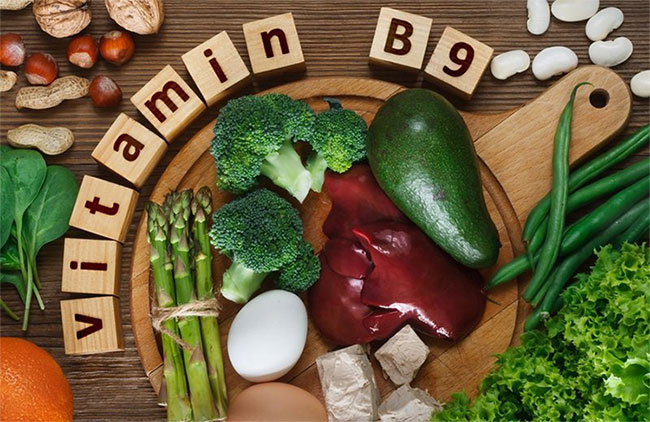A study by a team of experts from the United States and Israel has found that supplementing with folic acid (also known as vitamin B9) may help reduce the risk of dementia and early death.
According to the Telegraph, scholars from the Icahn School of Medicine (New York, USA) and the University of Haifa (Israel) observed that older adults with low levels of vitamin B9 are more susceptible to developing dementia. Low levels of this vitamin are also linked to an increased risk of early death.
The research, published in the journal Evidence Based Mental Health, was based on data from over 27,000 individuals aged 60 to 75 in Israel. These participants had no prior history of dementia before joining the study and were tested for vitamin B9 deficiency. They were monitored from January 2013 to October 2017, with approximately 3,418 participants found to be deficient in this nutrient.

Foods rich in vitamin B9.
The researchers discovered that this deficiency is associated with a higher risk of developing dementia and dying from any cause.
Among those who were deficient in vitamin B9, the estimated rate of dementia was 7.96 per 10,000 individuals per year. The estimated rate of death from any cause in this group was 19.2 per 10,000 per year.
In contrast, the estimated rate of dementia was 4.24 and death from any cause was 5.36 per 10,000 individuals per year among those who were not deficient in this vitamin.
In percentage terms, the dementia rate was nearly 3.5% and the overall mortality rate was just under 8% for those lacking vitamin B9. This compares to a dementia rate of just over 3% and a mortality rate of nearly 4% for those who were not deficient.
After accounting for potential influencing factors such as diabetes, depression, cognitive decline, vitamin B12 deficiency, smoking, and the use of folic acid supplements, individuals deficient in vitamin B9 had a 68% higher risk of being diagnosed with dementia. Notably, the risk of early death from any cause in this group was three times higher.
Vitamin B9 helps the body produce healthy red blood cells and is found in various foods. Rich sources of folic acid include spinach, watercress, okra, asparagus, beets, broccoli, Brussels sprouts, and legumes such as lentils and peas, as well as yeast and mushrooms. Additionally, many fruits like bananas, cantaloupe, lemons, orange juice, grapefruit, and organ meats such as liver and kidneys also contain this nutrient.
Experts recommend that pregnant women supplement with folic acid to support the proper and healthy development of the brain, skull, and spinal cord of the fetus.
In September 2021, the UK government announced that folic acid would be added to white flour across the country. The aim is to help prevent spinal issues in newborns. It is estimated that fortifying foods made from flour, such as bread, will help avoid about 200 cases of neural tube defects each year.
This new research suggests that this policy could provide even more benefits. Most adults and children can safely supplement with folic acid. However, individuals with cancer, vitamin B12 deficiency, those on dialysis, and those with heart stents should consult a doctor before taking this supplement.


















































